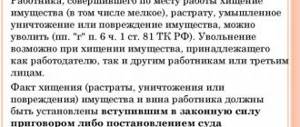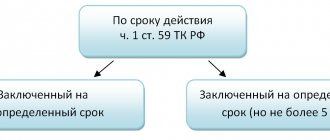An employment contract is a bilateral agreement concluded as a result of the emergence of rights and obligations between the employer and employee. Based on the employment contract (Article 56 of the Labor Code of the Russian Federation), the employee undertakes to perform his labor functions in accordance with the internal regulations existing in the organization, and the employer assumes the responsibility to provide certain conditions for work and timely and full payment.
Any changes to the employment contract related to the deterioration of working conditions and not complying with the provisions of the current labor legislation entail administrative liability (Article 5.27 of the Code of Administrative Offenses of the Russian Federation).
Forms of employment contract
According to the general rule, prescribed in Article 67 of the Labor Code of the Russian Federation, all labor relations that arise between an employer and an employee must be formalized in writing. The content of the employment contract must include reliable information about the parties or their representatives, in particular, documents, terms of execution of the contract, details and other necessary information. The employment contract is drawn up in two copies (or in more copies, if provided for by the legislation of the Russian Federation) with the personal signature of all parties. The fact that the person being hired has received his copy of the employment contract is confirmed by his personal signature on the employer’s copy. If the hired employee is a person under 14 years of age, the conclusion of the employment contract is signed by his legal representative, in particular, one of the parents or guardian. Russian labor legislation provides for a special rule for the form of an employment contract, where the role of the employer is an individual who does not have the status of an individual entrepreneur. In accordance with Art. 303 of the Labor Code of the Russian Federation, the employer must notify the local government authorities at the place of its registration about the conclusion of the relevant agreement. However, the law does not establish the consequences that arise if this condition is not met and the impact of registration on the validity of the concluded employment contract. In accordance with the labor legislation of the Russian Federation, it is allowed for an employee to perform his or her job duties actually on behalf of or with the permission of the manager (or his representative), that is, under the conditions of implied actions that may indicate an agreed desire to enter into an agreement in the future. In this case, the employer is obliged, no later than 3 days from the date of the employee’s actual admission to work, to conclude an employment contract in writing on previously agreed terms.
Registration procedure
The conclusion of an employment contract takes place in several stages.
At the first stage, the employee provides all the necessary documents. These include a diploma, passport, TIN, SNILS, and so on. In some cases, a medical examination may be required: it is mandatory for certain positions. Men provide military ID cards. If an employee gets a job for the first time, then a work book is issued - this is the responsibility of the employer. The exception applies only to those who apply for remote work. In this case, the person will have to independently apply to the pension fund to obtain SNILS.
In some cases, the employer has every right to demand a certificate of no criminal record. This applies to civil servants, educators and law enforcement officials.
Foreign citizens must submit a patent. Without it, a person cannot be hired. To receive sick leave in the future, you must provide a certificate of income from your previous place.
Types of employment contract
According to Russian legislation, employment contracts are officially classified depending on their duration and are:
- fixed-term contracts (concluded for a certain period, but not more than 5 years);
- contracts that are concluded for an indefinite period.
In turn, fixed-term employment contracts provide for several types of contractual agreements, which are based on the reasons for termination of their validity:
- Employment contracts with an absolutely definite term (for example, election to an elective position with a fixed term).
- Employment contracts with a relatively specific period (usually concluded between an employee and the head of an organization created to perform certain functions).
- Employment contracts are conditionally fixed-term (concluded with employees temporarily replacing an absent person).
A fixed-term employment contract is concluded in cases of temporary or seasonal work (Part 1 of Article 59 of the Labor Code of the Russian Federation), that is, when the labor relationship is determined by the nature of the work and the conditions of its implementation. Also, Part 2 of Article 59 of the Labor Code of the Russian Federation provides for cases when a fixed-term employment contract can be concluded exclusively by agreement of all involved parties. Accordingly, an employer’s refusal to hire a person wishing to sign an employment contract for an indefinite period will be considered unlawful, except in cases where the refusal is based on the lack of professional and business qualities of the potential employee.
An employment contract is considered concluded for an indefinite period if its clauses do not contain information about the duration of this employment agreement. The absence of a demand from one of the parties to terminate a fixed-term employment contract due to the expiration of its validity period indicates that the condition on the fixed-term nature of the contract loses force and employment agreements arise for an indefinite period.
Types of employment contracts also include civil service contracts, however, it is worth noting that such labor agreements are regulated by special laws regulating certain types of civil services. Labor legislation does not contain labor law provisions regarding persons:
- military personnel in the performance of military service duties;
- working on the basis of contracts of a civil nature;
- members of boards of directors (supervisory boards) of organizations (except for persons who have entered into an employment contract with this organization).
In addition to the main types of employment contracts, there are a number of other criteria on the basis of which an employment agreement is concluded:
- by type of employer (with legal entities or individuals);
- according to the specifics of the employee’s legal status (with minors, with foreign citizens and stateless persons);
- by the nature of the conditions (work in normal conditions, at night, harmful/dangerous conditions, work in special climatic zones, etc.).
Commentary to Art. 67 Labor Code of the Russian Federation
1. An employment contract can only be concluded in writing, in two copies, signed by the parties to the employment contract and kept by both parties.
2. An example of concluding an employment contract in a larger number of copies is an employment contract with the head of a federal state unitary enterprise, which requires approval from the Ministry of Economic Development of Russia (see Sample employment contract with the head of a federal state unitary enterprise, approved by Order of the Ministry of Economic Development of Russia dated March 2, 2005 N 49 // BNA RF. 2005. N 23).
3. Specific employment contracts can be drawn up in any form, but with mandatory consideration of the provisions of Art. 57 of the Labor Code on the content of the employment contract (see commentary to this article).
4. When concluding an employment contract, you can use the Recommendations for concluding an employment contract with an employee of a federal budgetary institution and its approximate form, approved by Order of the Ministry of Health and Social Development of Russia dated August 14, 2008 N 424n “On approval of Recommendations for concluding an employment contract with an employee of a federal budgetary institution and his in approximate form" (Bulletin of Labor and Social Legislation of the Russian Federation. 2008. No. 10).
Appendix No. 1 to this Order provides an approximate form of an employment contract with an employee of a federal budgetary institution, consisting of a preamble (where the number of the employment contract, the place and time of its conclusion must be indicated) and 3 sections.
Section 1 “General Provisions” names the position, profession or specialty, indicating qualifications or the specific type of work assigned; the full name of the branch, representative office is given if the employee is hired by a specific branch, representative office or other separate structural unit of the employer, indicating its location. It should be noted whether the employee’s job is primary or part-time. The period for which the employment contract is concluded must also be established: for an indefinite period, for a specific period (specify the duration) or for the duration of certain work, indicating the reasons (grounds) for concluding a fixed-term employment contract in accordance with Art. 59 Labor Code of the Russian Federation.
Read more: How to register a dacha plot as your property
Next, the date of entry into force of the employment contract and the start date of work must be stated.
If an employee is hired on a probationary period, its duration (months, weeks, days) is indicated.
Section 2 outlines the rights and responsibilities of the employee, and Section 3 outlines the rights and responsibilities of the employer. Basically, the rights and obligations of the parties to the employment contract, enshrined in Art. Art. 21 and 22 of the Labor Code of the Russian Federation.
5. For certain categories of workers, a special form of employment contract is provided (see, for example, the Resolution of the Ministry of Labor of Russia dated July 23, 1998, which approved Recommendations for concluding an employment agreement (contract), reflecting the specifics of regulating social and labor relations in the North, and Sample employment agreement (contract) with an employee hired to perform work in the regions of the Far North and equivalent areas // Bulletin of the Ministry of Labor of the Russian Federation, 1998. No. 9).
Order of the Ministry of Economic Development of Russia dated March 2, 2005 N 49 approved a sample employment contract with the head of a federal state unitary enterprise (BNA RF. 2005. N 23).
The above documents are applied to the extent that they do not contradict the Labor Code of the Russian Federation.
6. An employment contract that is not properly drawn up is considered concluded if the employee began work with the knowledge or on behalf of the employer or his representative. At the same time, the employer is entrusted with the obligation to properly formalize an employment contract with this employee (see paragraph 12 of the Resolution of the Armed Forces of the Russian Federation of March 17, 2004 No. 2).
Employment contracts by volume of work performed
Russian labor legislation defines the classification of contracts concluded depending on the volume of work performed:
- main job agreement,
- part-time work agreement.
In turn, the agreement on the performance of the main work presupposes that the employee carries out work in full and in accordance with the internal regulations established at the enterprise. Working at the main place also requires a place to store the work book. An employment contract concluded for the performance of combined work (Chapter 44 of the Labor Code of the Russian Federation) provides for the employee to perform other functions with regular payment, in his free time from his main job. The duration of part-time working hours should not exceed 4 hours a day, that is, 1/2 of the total working time for the corresponding accounting period. A part-time employment contract can be internal (with the employer at the main place of work) and external (with the employer of a third-party organization). The conclusion of a part-time employment contract can be concluded with an unlimited number of employers, unless prohibited by law. For example, professional coaches and athletes have the right to enter into a contract for part-time work only on the basis of permission from the employer of the main job. Employment contracts concluded for part-time work should be distinguished from:
- combining positions - when an employee is offered to perform another job for additional pay during the same working hours, which are provided for in the main contract;
- expanding service areas and increasing the volume of work - when an employee performs his job functions with greater intensity.
Concluding an employment contract for part-time work is not permitted with persons under 18 years of age, as well as with persons working in hazardous/harmful working conditions, if the proposed combined work has similar characteristics.
Contents of the document
According to Art. 9 of the Labor Code of the Russian Federation, the document is prepared in accordance with legislative norms. It cannot contain conditions that would infringe on the employee’s rights or worsen working conditions.
The contract contains the following information:
- TIN and full name of the enterprise;
- employee's passport details;
- requisites.
It is necessary to indicate identification documents, where and when the contract was executed. Enter the exact address at which professional activities will be carried out and the intended position.
If the contract is fixed-term, the end date is written. If the document is of an indefinite nature, then the start date of the activity is sufficient. The important part is the indication of the salary amount, additional payments and the timing of their receipt. If the enterprise contains harmful working conditions, then compensation is prescribed. The contract must include the boundaries of working hours and vacation time. The standard document contains the conditions of social insurance and labor.
All these requirements are contained in the relevant article of the Labor Code. Any changes must be made to the contract. Violations or illegal clauses (for example, the possibility of receiving fines) threaten the employer with problems.
Features of compilation
After reading the contract, the question should not remain about what conditions the employee will work under. The document must cover all the nuances of the work.
10 necessary points of the contract:
- Document Number;
- date of signing;
- names of the parties;
- structural unit where the employee is hired;
- operating mode;
- job title;
- amount of remuneration;
- the range of responsibilities of the employee, his rights;
- obligations and rights of the employer;
- responsibility of the parties.
All of the above are general rules on how to draw up an employment contract.
There are many other nuances that need to be taken into account when registering personnel. Often, due to the nature of their work, employees become aware of information about the company that cannot be disclosed. This is a trade secret, the disclosure of which will harm the entire business. Therefore, it is necessary to include a clause on non-disclosure of confidential information. You can also draw up a separate non-disclosure agreement for confidential data. It is better not to limit yourself to general phrases that a person has been hired by an organization. You need to indicate the department where he will work. Otherwise, the chances of terminating the contract for absenteeism will be minimized.
The contract template that the company uses must comply with labor law requirements.
Drawing up an employment contract is necessary to show what work rules the organization has and what information cannot be taken outside the office walls. If you include in the employment contract with the employee a provision that confidential information cannot be disclosed, then there is a greater chance that the information will be kept secret.
How to terminate
Termination can occur in three forms:
- At the will of the employee
- At the initiative of the employer
- Their joint decision
Each specific case, as a rule, is specified in the document. Another specific possibility of termination is the expiration of the period for which the TD was concluded.
Contents of the agreement
The agreement consists of the following parts:
Preamble, which indicates who exactly the parties to the transaction are.- Introductory part.
- Rights and obligations of the parties.
- Place of work.
- Conditions of remuneration.
- Rules for terminating the agreement, etc.
At the request of the parties, the employment agreement may be supplemented with other clauses and paragraphs.
What cannot be included in the contract
There are several points that cannot be included in the agreement (Table 2).
| Conditions | Description |
| Condition for payment of wages in foreign currency | The law stipulates that wages are paid exclusively in rubles. It is not allowed to specify conditions for other currencies. |
| Conditions that infringe on employee rights | This may include, for example, conditions prohibiting entering into a part-time employment relationship with any other employer. |
| Condition for a long probationary period | As a general rule, the time allotted for testing should not exceed six months. If this condition is violated, the employee has the right to apply to the competent authorities to protect his rights. |
The difference between a contract and a civil law
The document gives rise to specific relations provided for by the Labor Code of the Russian Federation. A civil legal agreement is regulated directly by the Civil Code of the Russian Federation. It does not provide for the need to systematically attend work, receive monthly money, etc. As a rule, the scope of work and the final payment for this are agreed upon. There are also no social guarantees for such citizens (annual paid leave, sick leave, parental leave, etc.).
Video with differences:
Thus, an employment agreement is a written act obliging the parties to comply with certain requirements. These legal relations are regulated by the Labor Code of the Russian Federation and internal local acts of organizations.
Top
Write your question in the form below






